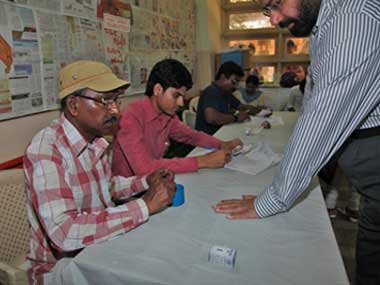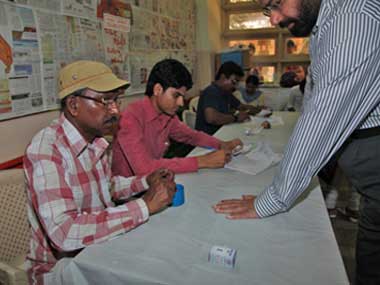Mumbai: Change was the mantra in South Mumbai for those who bothered to vote as an anti-Congress wave appeared to sweep voters towards Shiv Sena candidate Arvind Sawant in the absence of a BJP candidate on the ballot. Congress MP Milind Deora won easily from South Mumbai in 2009, benefitting from votes being split between the Shiv Sena and MNS candidates. This time around though, voters who spoke to Firstpost said they were determined to cast their ballot with both eyes firmly on the Central government.[caption id=“attachment_1495963” align=“alignleft” width=“380”]  A poll centre in South Mumbai. Firstpost[/caption] “We want a good government at the Centre,” said Ashok (named changed) a 50-year-old businessman who had just voted at the Chandaramji Girls High School on VP Street near Bhuleshwar, an area known for its over 100 temples, including the Mumba Devi Temple. Most of the shops in the area were open and people were going about their business as if it was an ordinary day. Ashok was seated on a bench in front of a row of shops with three of his friends and said he chose not to vote on the basis of the local candidate in this election. “We want someone who can take the country forward,” he said. The four men claimed they had historically voted for the Congress but this time they wanted change. They admitted they would have much preferred to vote for a BJP candidate but in the absence of one, voted for Sawant as they saw a vote for the Shiv Sena as equivalent to a vote for the BJP since the two parties had formed a poll alliance. “We want something better than this. You go to any government office and openly people are asking for a bribe. They say the minister wants money, that they will keep 10 percent and 90 percent will go to the minister. That has to change,” said Ashok. There was a trickle of voters going in and out of the VP station polling booth around 10.30 am. Among them was Hemang Pandiya, a middle-aged Gujarati businessman, who said Narendra Modi was the only logical option if India wanted to get its economy back on track. “We are giving our vote to Modi. Modi must come,” he told Firstpost. However, he was ambivalent on the issue of corruption, saying “if there is no corruption, then work will not happen quickly”. Pandiya also cited Modi’s standing as a strong Hindu leader as a reason to vote for him. “Modi is able to keep the peace in Gujarat. That is why people want to go to Gujarat to do business. That is important.” At the same time, he pointed out that Modi must be able to deliver on his promises and aspirations. “Marketing is not enough,” Pandiya said. There was even less activity at the Marwari High School in Opera House. Most of the businesses in that area had their shutters down and barely a handful of voters showed up around mid-day. Diamond trader Shaurin Jhaveri and wife were two of those voters and were adamant that change had to happen. For them too, the issues of corruption, infrastructure development and inflation were the most urgent. “Prices are just going up. Vegetables. Milk. What will people eat?” There was much more action the Jain Institute of Technology grievance cell set up opposite Central Plaza cinema. The four-room office faced a constant stream of irate voters whose names had either been deleted from the rolls or were missing entirely. Among them were 52-year-old Rasesh Chokshi and his wife Swathi found their names were on the rolls but had been stamped with the word deleted. They had moved apartments but had chosen not to change their voting address because they were worried it would not happen in time to allow them to vote in this election. Despite possessing voting cards, the Election Commission officials told them someone had visited their old address, found they weren’t living there anymore and had them removed. Therefore they would not be able to vote. Others at the office claimed their names were missing even though they had not moved and had voted in previous elections. Twenty-something Pratiik Raval, who lives in Gold Coin at Haji Ali, said he never received his election slip this time around and claimed there were 20 others in his building who suffered the same fate. Particularly irate was 35-year-old Mitsu Pakrasa. She had a lengthy argument with the head of the grievance cell that went nowhere and vented her frustration to Firstpost. “I am a responsible citizen who has all the documents in place. But I am not allowed to vote because they have not made any mention anywhere of my name. My father, my mother, my sister, my brother, everybody’s name is there. My name is not there. I have no idea why. “I am 35 years old. I have voted as much as I can. I don’t know what to do. I don’t know whom to go fight with. We so badly want a change and to make a difference to this country but they are not giving us the power,” she said. Had she been able to vote, Pakrasa said she too would have voted for Modi. She alleged that about 50 people from her building, Tirupati Apartments near Mahalaxmi temple, had also discovered their names were missing and were similarly locked out of the vote. “Turnout would be 10 percent higher if not for this carelessness,” Pakrasa said. While most of Mumbai saw a typically low turnout on voting day, there was a steady stream of sedans and SUVs pulling up to the entrance of the polling booth at the Cathedral and John Connon Infant School on Malabar Hill. A policeman who had been on duty at the booth since yesterday estimated the turnout to be around 50 percent up until 3 pm. “A lot ‘of Parsees live in this area and they are very conscientious when it comes to voting, he said. Here too most people Firstpost spoke to said they voted for the BJP even though there was no BJP candidate on the ballot. They felt a vote for the Shiv Sena candidate, Sawant, was effectively a vote for Narendra Modi and the BJP. “Change is necessary,” said a group of three women in their early twenties. When asked who represented change, the reply was simple: Narendra Modi. “We have seen his enthusiasm and his spirit to do something for the country,” one of them explained. “We have seen what he has done for Gujarat.” For most of the voters, the local candidate did not matter. It was more important to look at the bigger picture and elect a stable and strong government at the Centre that would tackle the twin issues of corruption and economic development. “Everything comes down to corruption,” Ashwin (named changed) said. “If corruption goes, then the economy will improve.” Dressed in a t-shirt and jeans, Ashwin and his two friends wanted a government that would improve infrastructure in the country and bring down inflation. Others felt that it was possible to tolerate some amount of corruption as long as something was simultaneously done for the country. The problem with the Congress was that they had become just corrupt, said Preethi (named-changed), who is in her late twenties. “Modi has shown some improvement in Gujarat. He should be given a chance,” she said. Even when local issues were a factor, the scale was tilted against the Congress. “Did not give Congress my vote because of rising prices that is making everything expensive,” said a young Muslim man with his wife, who was in a full burkha. “We have no confidence in Congress.” There was some support for the Congress (almost everyone dismissed AAP for two reasons: being too new and for choosing to walk away from governing Delhi). An elderly Parsi couple said they had wanted the “right person” to be elected and voted for the existing government. And there was Bharat (name changed), who felt change was needed to reduce corruption and increase development. However, in the absence of a BJP candidate, he could not bring himself to vote for the Shiv Sena or the MNS. In the end, he simply voted again for the Congress.
This time around though, voters who spoke to Firstpost said they were determined to cast their ballot with both eyes firmly on the Central government.
Advertisement
End of Article
Written by Tariq Engineer
Tariq Engineer is a sports tragic who willingly forgoes sleep for the pleasure of watching live events around the globe on television. His dream is to attend all four tennis Grand Slams and all four golf Grand Slams in the same year, though he is prepared to settle for Wimbledon and the Masters. see more


)
)
)
)
)
)
)
)
)



